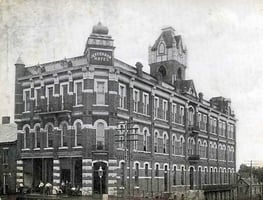Early Days and Traveling Troupe: Wyoming Frank, a charismatic figure of the late 19th century,...
History of Florence, Alabama

Studying the history of Florence, Alabama
Studying the history of Florence, Alabama offers a captivating look back through time. Florence's story begins millennia ago, as evidenced by archaeological sites dating back to the Woodland Period or more. Native lands in the region were eventually ceded (forcefully taken) to the United States government, and in 1817, the Alabama Territory was established, setting the stage for future development.
The town's modern history began with the Cypress Land Company, which was founded by prominent figures including General John Coffee, a celebrated hero of the Battle of New Orleans. Coffee's leadership and influence were instrumental in the establishment of Florence in 1818. The town's name was bestowed by an Italian surveyor, Ferdinand Sannoner, who chose it as a tribute to his beloved Florence on the Arno River.
Florence's early years were marked by significant growth. The construction of the Jackson Military Road facilitated trade and travel, while the establishment of a textile factory in 1818 marked the beginning of the region's industrial development. However, the Civil War brought a period of turmoil and destruction, with Florence changing hands multiple times and suffering significant damage. A large troop presence camped near Gravelly Springs, Alabama.
Florence persevered past the Civil War and the city's population experienced a remarkable resurgence in the late 19th century, fueled by economic growth and development. Innovation also played a crucial role. The construction of canals to navigate the Muscle Shoals on the Tennessee River was a significant engineering feat, facilitating steamboat travel until the completion of the Wilson Dam in 1925.
Beyond its commercial achievements, Florence has fostered a vibrant cultural and intellectual scene. La Grange College, which later evolved into the University of North Alabama, was established in 1885. The city has also produced four Alabama governors, demonstrating its political influence.
Florence's rich history is not limited to its political and economic achievements. The city is also renowned for its contributions to the arts. W.C. Handy, the "Father of the Blues," was born in Florence and his music continues to inspire and entertain audiences worldwide.
As you explore Florence today, you'll find a city that has preserved its historical heritage while embracing the modern world. From its ancient roots to its vibrant present, Florence offers a captivating journey through time, waiting to be discovered.


